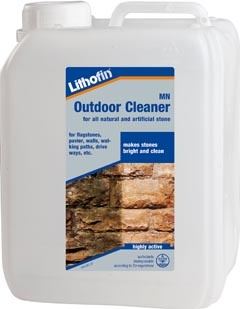Now that the height of the hard landscaping season approaches it is reassuring to know that there are specific products available to maintain the immaculate appearance of external stone.
As it is also an ideal time to refresh existing outdoor patios and paths, there is no better time to start the process and the Lithofin range offers effective products that have been specially designed and tested for this purpose.
In situations where the outdoor surface requires sealing, Lithofin MN Stain Stop (solvent based) or Lithofin Stain Stop W (water based – ie solvent free) will provide oil, water and grease repellence and offer reassuring protection levels for exterior natural and artificial stone surfaces.
The prevention of dirt penetration ensures that maintenance remains straightforward and with the comprehensive range of Lithofin products available, external stone surfaces can be maintained with ease.
Lithofin MN Power Clean can be used for light cleaning of external stone and is ideal for use where stone surfaces run from inside to outside areas. There is the benefit of being able to use one product for both areas to ensure a consistent appearance.
Inevitably, surface contamination can occur over time and will require the use of an appropriate cleaning product. Lithofin MN Outdoor Cleaner is a highly active cleaning product that works both rapidly and thoroughly to remove stubborn dirt and plant deposits. It also solves the problem of black spores and results in natural and artificial stone surfaces looking bright and clean.
Voted ‘Best Buy’ in garden magazines and scoring highly for cleaning and biocide action, this is an essential product for the maintenance of external stone surfaces. Lithofin MN Outdoor Cleaner is available in both 1 litre and 5 litre sizes.
On surfaces where there is less stubborn contamination and in situations where green algae forms on the surface, Lithofin Algex can be used.
Lithofin Algex is a water-soluble cleaning concentrate that is neutral and free of chlorine and acid. Being self-acting, it removes both common dirt caused by leaves and trees and green algae deposits.
A preventative effect ensures that surfaces remain clear of green deposits for up to a year.
Tip: Several days after using Lithofin MN Outdoor Cleaner, treat the surface with Lithofin Algex to keep outdoor surfaces clean and free of algae deposits, ensuring beautiful looking stone every year.
Want help? Call the Lithofin Technical Helpline on 01962 732126.
Resinated natural stone still needs sealing
by Dipl. Chem. Andreas Schmeizl, Technical Department, Lithofin.
It has become common practice to treat natural stone slabs with resin before polishing them. This treatment alters the porosity of the stone – the rate at which liquids penetrate. It is important to keep in mind the altered characteristics of these stones because although they have been ‘treated’ they are by no means protected.
Why resinate natural stone?
Most natural stones feature small holes and fine cracks as part of their natural characteristics. These mostly unwanted irregularities are filled with resin in order to create an even and shiny stone surface.
Imperfections that result from the polishing process also become much less visible. The structure and the colour of the stone are enhanced – this colour intensification can clearly be seen along the edges of the slab where resin has run off the surface. Occasionally, pigments are added to the resins to achieve a higher and more even colour brilliance on hard stones such as gabbros.
At the same time, the absorbency of the natural stone is reduced. This water repellence is also the reason why resinating is often confused with protective treatments.
Quick test for identifying resinated surfaces: water pearls on the surface.
Characteristics of resinated stone
Resin provides a short-term guard for the natural stone surface but it does not provide sufficient protection for kitchen worktops. The resin slows the absorption of oil and grease but it does not prevent it and once these substances have penetrated the surface they leave stains that are difficult to remove. Common vegetable oil, for example, can stain within a few minutes. Properly treating the stone is therefore still necessary.
The pigments used to create an even colour on black stones are often not resistant to acid, so leaving acid on these surfaces too long (for example a bottle of vinegar with a few drops running down it) can result in clearly visible stains.
Protection and Care
Water-based impregnators have become increasingly popular because they are easier to use and more environmentally friendly than solvent-based products. Unfortunately, resin creates a barrier for water-based impregnators, not only filling the pores but also developing a hydrophobic effect. So water-based impregnations do not work properly and only provide a minimal resistance to stains.
The only way to achieve the optimal protection of resinated surfaces is to use solvent-based products, although the solvents do not have to be petrochemical. Organic solvents (carbohydrates) are capable of carrying the active ingredients into the stone. Keep in mind, though, that it will take slightly longer to achieve the full protective effect because the resins slow down the evaporation of the solvents.
Even after treatment with an appropriate impregnator, kitchen worktops require a certain level of care to avoid discolouration. The protective treatment simply allows more time to remove any dirt from the surface before stains form. It is therefore important to wipe up any spills immediately and to use the correct cleaning and maintenance products. And a full range of cleaning and sealing products is available from Lithofin.

